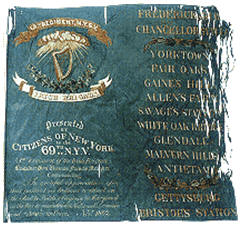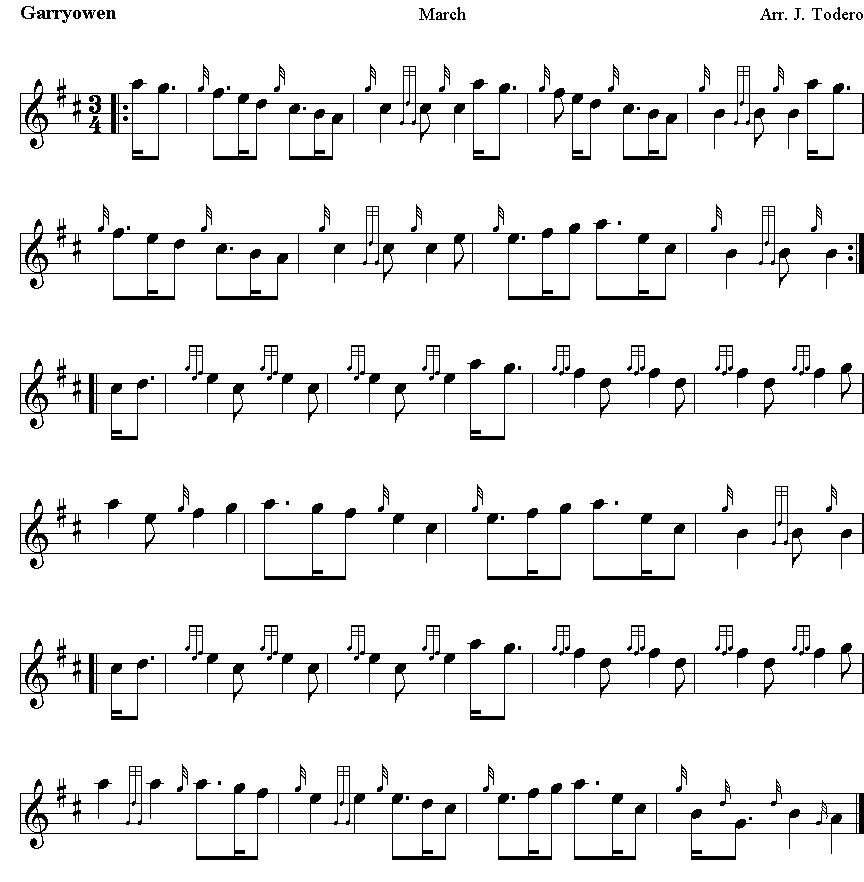The origins of Garryowen are unclear, but it emerged in the late eighteenth century, when it was a drinking song of rich young roisters in Limerick. It obtained immediate popularity in the British Army through the 5th (Royal Irish) Lancers, who were garrisoned in Limerick and was played throughout the Napoleonic War, becoming the regimental march of the 18th Foot (The Royal Irish Regiment).
A very early reference to the tune appears in The Life of the Duke of Wellington by Jocquim Hayward Stocqueler, published in 1853. He describes the defense of the town of Tarifa in late December 1811, during the Peninsular War. General H. Gough, later Field Marshall Hugh Gough, 1st Viscount Gough, commanding officer of the 87th Regiment (at that time known as the Royal Irish Fusiliers), after repulsing an attack by French Grenadiers "...was not, however, merely satisfied with resistance. When the enemy, scared, ran from the walls, he drew his sword, made the band strike up 'Garry Owen', and followed the fugitives for two or three hundred yards."
Garryowen was also a favorite in the Crimean War. The tune has also been associated with a number of British military units, and is the authorized regimental march of The Irish Regiment of Canada. It was the regimental march of the Liverpool Irish, British Army. It is the regimental march of the London Irish Rifles (now part of The London Regiment (TA)). It was also the regimental march of the 50th (The Queen's Own) Foot (later The Queen's Own Royal West Kent Regiment) until 1869.
Garryowen became the marching tune for the 69th Infantry Regiment, New York Militia, (the famed "Fighting 69th" ) in the mid-1800s. The "Fighting 69th" adopted Garry Owen before the Civil War and recently brought it back to combat in Operation Iraqi Freedom
It later became the marching tune for the US 7th Cavalry Regiment during the late 1800s. The tune was a favorite of General George Armstrong Custer and became the official air of the Regiment in 1867. According to legend it was the last tune played before the Battle of the Little Bighorn.
The name of the tune has become a part of the regiment, the words Garry Owen are part of the regimental crest, and there is a Camp Garry Owen, north of Seoul, Korea, which houses part of the 4th Squadron of the regiment.The Seventh Cavalry regiment became a part of the US 1st Cavalry Division in 1921, and "Garryowen" became the official tune of the division in 1981.
The word garryowen is derived from Irish, the proper name Eóghan ("born of the yew tree") and the word for garden garrai - thus "Eóghan's Garden". The term refers to an area of the town of Limerick, Ireland.
In 1993, the popular Civil War Music Company, The 97th Regimental Stringband, recorded 'Garryowen' on their 'Marching Along' (Volume 6), a CD of Marching tunes.
The tune became the name for bases established by the Cavalry in current conflicts. The most recent being Combat Operating Base, (COB), Garry Owen in the Maysan Province of Iraq. The base is near the city of Al Amarra and was established by the 2/7 CAV.
Garry Owen most recently was also the Regimental Quick March of "The Ulster Defense Regiment" CGS (UDR). When the UDR merged with "The Royal Irish Rangers" in 1992 to become "The Royal Irish Regiment" Garry Owen was dropped as the Regimental Quick march and was replaced with Killaloe, both these tune are worthy of being a Regimental Quick march.



